Mushroomer25
Member
The #PerformanceMatters hashtag has been gaining steam on Twitter today, with several prominent voice over actors (belonging to SGA-AFTRA, a division of the Screen Actor's Guild) in the gaming industry voting to initiate a potential strike. This is in the effort of contract negotiations, where many VO artists are looking to earn more compensation for their craft.
Here's a quick rundown of what SGA-AFTRA is looking for, from the guild's website.
What We Stand For
Performance Bonuses
Vocal Stress
Stunt Coordinator on Performance Capture Volume
Transparency
According to SAG-AFTRA, here are some of the proposals that their employers have put forward that they find "reckless and ill-advised"
SAG-AFTRA has also posted an FAQ detailing the potential strike.
It's a very interesting issue. The contract being negotiated was initially drafted in 1990, and hasn't seen major revision since then. The union is clearly under the impression that they're being under-compensated for their work, as gaming as extended into a major industry. A strike is entirely possible, and the ripple effects could bleed into the consumer perspective. The votes won't be tallied until October 5th, so there's some time before we know the outcome of this campaign.
TL;DR - Division of the Screen Actors Guild that represents Gaming VO actors wants a new contract, some major publishers disagree, a strike could be imminent as soon as next month.
@KenLally
Game industry makes 3 TIMES as much annual $ as the Hollywood film industry. Actors don't#PerformanceMatters

@GreyDeLisle
Just voted YES on an Interactive Strike Authorization!!!! #PERFORMANCEMATTERS
#iamonboard2015

@DavidBHayter
Dear actors & gamers,
Please retweet if you agree that #PerformanceMatters in video games.
#IAmOnBoard2015

Here's a quick rundown of what SGA-AFTRA is looking for, from the guild's website.
What We Stand For
SAG-AFTRAʼs package of proposals has been crafted with input from interactive performers every step of the way. We started with one-on-one meetings with the top performers in the industry. Then we held dozens of small in-home gatherings, organized three big social events and had a Wages and Working Conditions caucus. Below are the issues that came up time and time again. These are the four issues that make up the bulk of our proposal package.
Performance Bonuses
You might call them residuals, secondary payments, royalties, pay bumps or whatever suits your fancy. It is simply the idea that, if a video game is wildly successful, actors should share in its financial success. There is ample precedent for residual income for actors, yet they’ve historically been extremely difficult to achieve in this contract. The formula we propose is as follows:
We’re asking for a reasonable performance bonus for every 2 million copies, or downloads sold, or 2 million unique subscribers to online-only games, with a cap at 8 million units/ subscribers. That shakes out, potentially, to FOUR bonus payments for the most successful games: 2 million, 4 million, 6 million and 8 million copies.
Vocal Stress
We believe actors should get stunt pay for vocally stressful recording sessions the same way they get stunt pay for physically demanding roles. That’s why we’re proposing to limit “vocally stressful” recording sessions to two hours at the same union minimums.
Stunt Coordinator on Performance Capture Volume
Many actors feel unsafe without a stunt coordinator because they are often asked to do things that could potentially be dangerous to themselves or others. For example, once, without a stunt coordinator on set, a video game developer tried to do a wire pull - which means he basically made himself jerk really hard and fast across a room - without someone on set to monitor his safety. He, of course, got hurt and couldn’t go back to work for a long while. This is just one instance among many.
Transparency
Our proposal is that we need to know more about the projects that we’re working on. We propose that the actual title of the project should be made available to at least our representatives before we are asked to audition. Again, precedent is on our side here. You wouldn’t work on a TV show, commercial or film without knowing what part you’re playing and how it fits into the story, yet we are asked over and over again to do just that in interactive media. Our proposal also asks for the following information whenever reasonably possible: How many sessions are you expecting to book? What rating are you planning to get? Why? Is there offensive content? Will the sessions be vocally stressful? Transparency is key. We deserve to clearly know what we’re getting into before we commit to a role in a game.
Your Interactive Committee has worked hard to bring the concerns of working video game performers to the negotiating table.
On Feb. 2, a group of video game performers and video game producers met to renegotiate the Interactive Media Agreement.
Some of the folks in the room were big hitters and signatories to the existing contract, including EA Games, Activision, Disney and Warner Bros., as well as smaller recording studios like Blindlight and Formosa. We put our proposals on the table, they put their proposals on the table, there was some polite and spirited back and forth, but no agreement was reached.
Both sides met again on June 23. Still, no agreement was reached.
According to SAG-AFTRA, here are some of the proposals that their employers have put forward that they find "reckless and ill-advised"
- Our employers propose to fine you $2,500 if you show up late or are not “attentive to the services for which [you] have been engaged.” This means you could be fined for almost anything: checking an incoming text, posting to your Twitter feed, even zoning out for a second. If a producer feels you are being “inattentive,” they want the option to fine you $2,500.
- Our employers propose to fine your agent $50,000-100,000 if they don't send you out on certain auditions (like Atmospheric Voices or One Hour One Voice sessions). And if your agent chooses not to submit you for certain auditions, the employers want it put into contract language that SAG-AFTRA will revoke the agent’s union franchise. This would mean your agency would not be able to send you or anyone else they represent out on any union jobs, including those in animation, TV/Film, Commercials, etc.
- Our employers don’t believe that Motion and Performance Capture work is covered under this contract. The companies also proposed they be allowed to hire their own employees to play characters in video games without having to join the union.
- There are other proposals that reduce integration/reuse fees and allow the sunset of Cloud Gaming provisions that rollback the gains we’ve made in previous contracts.
SAG-AFTRA has also posted an FAQ detailing the potential strike.
HAVEN'T WE PUT OURSELVES IN THIS POSITION BY ASKING FOR BACKEND BONUS?
Over and over, interactive performers have identified of a backend bonus as a top concern. There is ample precedent for secondary payments across the media landscape. You get secondary payments when you perform in feature films, animation, episodic TV, commercials and the like. But that wasn't always the case. Performers who came before you had the courage to fight for the residual payments you enjoy today, and, because they stood together, they won them.
The top games make money. This industry has grown, boomed and morphed into something bigger and lucrative than any other segment of the entertainment industry, and it continues to do so. The truth is, back end bonuses are not uncommon in the video game industry. Last year, Activision's COO took home a bonus of $3,970,862. EA paid their executive chairman a bonus of $1.5 million. We applaud their success, and we believe our talent and contributions are worth a bonus payment, too.
AREN’T THEY JUST TRYING TO TAKE CARE OF THEIR BUDGETS?
Sure. Most of the smaller and less popular games won’t be affected by the residuals payment. We structured our proposal to trigger at 2 million units, the point we would regard a game as a blockbuster. We want the video game industry to keep growing. Growth = More work for us! As for the big games, we know the companies already budget for sales-based bonuses for many of their employees. So maybe the companies are trying to protect the budgets for their top executive bonuses, but is it not reasonable to suggest that performers should also share in these successes?
CAN I WORK ON A VIDEO GAME DURING THE STRIKE?
No. You will not be able to work under the interactive contract while the strike is in effect. But please know, the community would only decide to strike if the short-term risk of loss-of-work is outweighed by the long-term gain of a better contract in a growing industry.
It's a very interesting issue. The contract being negotiated was initially drafted in 1990, and hasn't seen major revision since then. The union is clearly under the impression that they're being under-compensated for their work, as gaming as extended into a major industry. A strike is entirely possible, and the ripple effects could bleed into the consumer perspective. The votes won't be tallied until October 5th, so there's some time before we know the outcome of this campaign.
TL;DR - Division of the Screen Actors Guild that represents Gaming VO actors wants a new contract, some major publishers disagree, a strike could be imminent as soon as next month.

